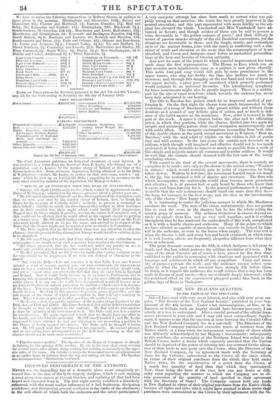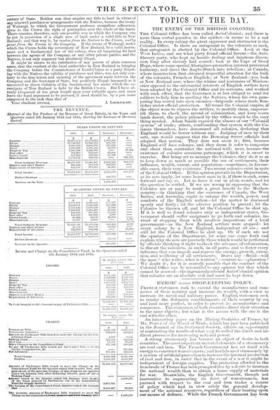THE NEW ZEALAND QUESTION.
TO THE EDITOR OF THE SPECTATOR.
Sin—I have read with very great interest, and also with very great snr prise, " The Results of the New Zealand Inquiry," published in your Sup- plement of the 4th instant. Under what misconceptions, or bias, or in- fluences, or feelings, such an inquiry should have become necessary, I am utterly at a loss to understand. After a careful perusal of the official docu- ments presented in your able and I may add most extraordinary Supple-. meat, it appears to me that the question at issue between the Colonial Office end the New Zealand Company lies in a nut-shell. The Directors of the New Zealand Company purchased extensive tracts of territory from the Native chiefs, at a time when the independent sovereignty of those chiefs was distinctly acknowledged by her Majesty's Government: subsequently to this purchase, the sovereignty of the Northern Island was ceded to the British Crown, under a treaty which expressly provided that the Natives should be deprived of the power of entering into any contract for the aliena- tion of their lands to any party save the Crown: then, the Directors of the New Zealand Company, by an agreement made with the Secretary of State for the Colonies, suerendered to the Crown all the lands which, in virtue of their original purchases from the chiefs, they held tinder Native titles, for the consideration of a grant from the Crown of a much less quantity of land than that which they surrendered. Now, these being the facts of the case, how can any doubt or diffi- culty exist regarding the manner in which the Company are to Min possession of the quantity of land specified in their agreement with the Secretary of State? The Company cannot hold any lands in New Zealand in virtue of their original purchases from the Native chie because all rights and titles which might have accrued- to them under their purchases were surrendered to the Crown by their agreement with the'St- cretaz7 of State. Neither can they acquire any title to land in virtue of any renewed purchase or arrangements with the Natives, because the treaty of Waitangi, to which the Government professes scrupulous adherence gives to the Crown the right of preemption over the whole of the lands. There remains, therefore, only one possible way in which the Company can be put in possession of a single acre of land under a valid title in New Zealand; and that way is, by cession from the Natives to the Crown, and by rant from the Crown to the Company. If the treaty of Waitangi, under which the Crown holds the sovereignty of New Zealand, be a valid instru- ment and a fundamental law of the colony, then all bargaining for land between the agents of the Company, or any other private parties, and the Natives, is not only nugatory but absolutely illegal. It might be shown to the satisfaction of any person of plain common sense, that the conduct of the local authorities in New Zealand in bringing the Company before the Commissioner of Land-Claims as a party litigat- ing with the Natives the validity of purchases and titles, was not only con- trary to the true intent and meaning of the agreement made between the Company and the Secretary of State, but positively illegal; inasmuch as it amounted to direct violation of the fundamental law under which the so- vereignty of New Zealand is held by the British Crown. But I have al- ready trespassed at too great length upon your valuable space, and must leave the legal argument to be pursued, if need should be, by a pen more competent to the task than that of



























 Previous page
Previous page